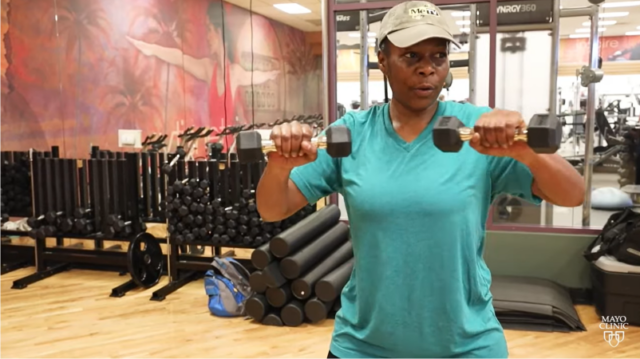
Heart disease is the No. 1 cause of death in women in the U.S. And African American women have an even higher risk of dying from heart disease ― and at a younger age ― than white women, according to the National Heart, Lung and Blood Institute.
In this Mayo Clinic Minute, Dr. LaPrincess Brewer, a Mayo Clinic cardiologist, says this serious issue is compounded by the fact that many African American women are not aware of their risk.
“Each year, more African American women die from heart disease than breast cancer, lung cancer and strokes combined,” says Dr. Brewer.
But what are the factors that increase their risk of developing heart disease?
“African Americans have the highest hypertension rates in the world. African American women are also the least physically active group of women in the United States. Now’s the time that we focus on changing the narrative on heart health and African American women.”
Dr. Brewer says African American women face a high burden of negative social determinants of health, such as chronic stress related to factors like food insecurity, systematic racism, the wealth gap and socioeconomically disenfranchised communities. These factors can prevent them from living a healthy lifestyle and controlling many heart disease risk factors.
It’s important these health disparities are addressed on community and societal levels. Dr. Brewer says it’s also going to take interventions from each person.
“I truly recommend that African American women be diligent to protect their own hearts and also take time for themselves. Self-care really does matter,” says Dr. Brewer.
Dr. Brewer recommends that all women keep heart health as a priority and follow the American Heart Association’s “Life’s Simple 7” lifestyle changes to achieve ideal heart health:
- Manage blood pressure.
- Control cholesterol.
- Reduce blood sugar.
- Get active.
- Eat better.
- Lose weight.
- Stop smoking.
“Courtesy: Mayo Clinic News Network.”
Republished with permission[/vc_message]
Disclaimer
Artificial Intelligence Disclosure & Legal Disclaimer
AI Content Policy.
To provide our readers with timely and comprehensive coverage, South Florida Reporter uses artificial intelligence (AI) to assist in producing certain articles and visual content.
Articles: AI may be used to assist in research, structural drafting, or data analysis. All AI-assisted text is reviewed and edited by our team to ensure accuracy and adherence to our editorial standards.
Images: Any imagery generated or significantly altered by AI is clearly marked with a disclaimer or watermark to distinguish it from traditional photography or editorial illustrations.
General Disclaimer
The information contained in South Florida Reporter is for general information purposes only.
South Florida Reporter assumes no responsibility for errors or omissions in the contents of the Service. In no event shall South Florida Reporter be liable for any special, direct, indirect, consequential, or incidental damages or any damages whatsoever, whether in an action of contract, negligence or other tort, arising out of or in connection with the use of the Service or the contents of the Service.
The Company reserves the right to make additions, deletions, or modifications to the contents of the Service at any time without prior notice. The Company does not warrant that the Service is free of viruses or other harmful components.












